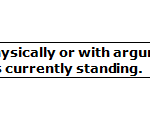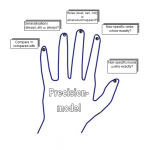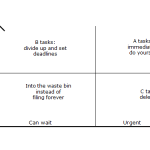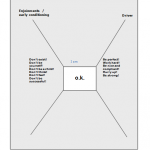Overview Which is the most important skill in conversation? There are many varied answers to the question of which is the most important or central skill in communication (and hence also in leadership). Asking the right questions, the art of formulation, framing, structure and construction of conversations, attitude and view of humanity. One […]
Category Archives: Allgemein
Contact/ Rapport
There are many idioms and sayings that describe what happens between two people who have a good connection: they can read each others minds, they have a direct line, they are on the same wavelength, they have a special chemistry, they sympathise etc. When this is the case, meetings, talks and negotiations – even […]
Meta-Model of language
The term "inadequate productivity" (as a linguistic representation) will be understood in six different ways by six different members of staff, since they have six different experiences with it. In individual cases, the term "insufficient productivity" could also be hiding deeper structures (previous experiences, assumptions etc.) under its surface, which the individual is […]
You- message versus I- message
I-messages Sending I-messages. If expectations are not fulfilled, if I cannot accept certain behaviour or if I myself am in conflict with my partner, I can use "I-messages" to tell him that I am also a person with feelings, who is annoyed, disappointed, vulnerable. The I-message gives the other person information on how I am […]
Meeting Conditions
Considerations on the meeting conditions Many meetings fail or become a breeding ground for conflict because the necessary clarifications have not been communicated in advance. Role, relationship Preconceptions about role, purpose and intentions remain hidden and lead to misunderstandings for others. What role am I acting in? What hat do I have on? The same […]
Meeting Preparation
Questions on meeting preparation What is the reason for the meeting? What advance information do I have? Is it about facts? What have I noticed myself? Is the information first or second hand? Can it be used? What information is based on assumptions? Which role am I acting in? Is this part of my role? […]
Self- Coaching
1. Basic feelings Indication: Conflict in the system (family, career, group …) Goal: X wants to be able to behave more flexibly towards Y, in order to remove the feed from the conflict which is putting such a strain on X himself and the system. Method: […]
Eisenhower-Matrix
In order to cope with the large number of tasks in a working day, the first step must be to put these into some kind of order. Eisenhower’s matrix is an extremely effective technique for this. The tasks are sorted by two criteria, "importance" and "urgency". According to this, there are four […]
Personal inner drivers
Every person in our performance oriented society is influenced by inner attitudes, beliefs and behavioral programmes that either help or hinder him. In the minds of modern people there exist five principally hindering attitudes that have an influence on the behavior. These attitudes especially appear in distress and seem to be helpful, while in reality […]
Personal inner drivers – test
Driver Test Please read the statements below carefully and then answer how much these statements apply to you actually using the evaluation scale: totally = 5 mostly, generally = 4 a little bit = 3 nearly not = 2 not at all = 1 1. ( ) When I fulfill a task […]



